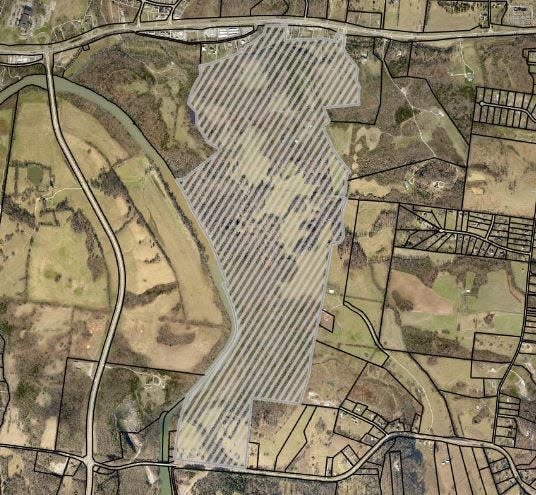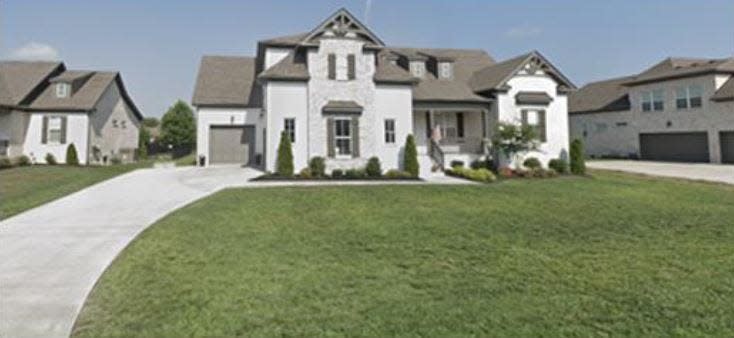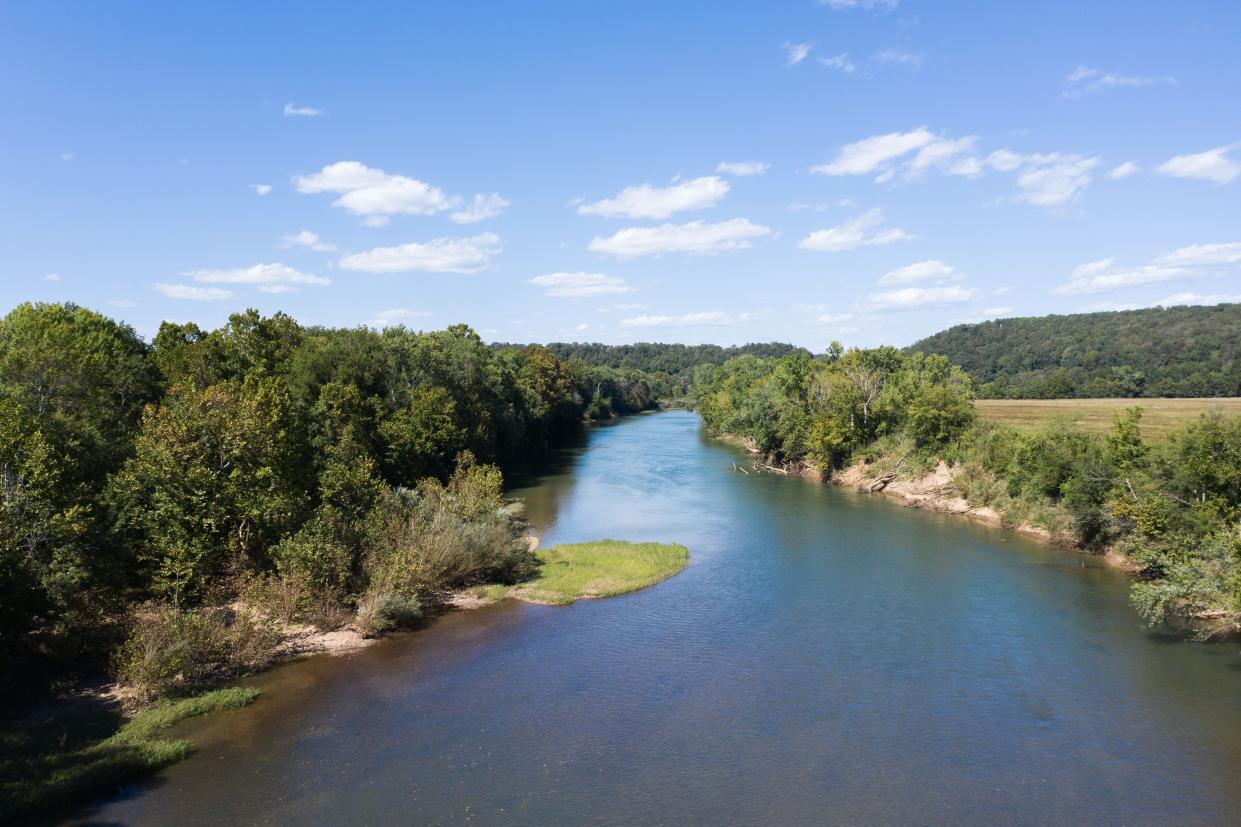Planners deny Columbia Bluffs 400-acre annexation off Bear Creek Pike for mixed-use PUD

An annexation request to build the 800-home Columbia Bluffs project was denied earlier this month by Columbia's Planning Commission.
The request, which was brought before planners April 10 after being deferred last month, was to approve annexation of more than 400 acres off Bear Creek Pike. The property would then be zoned as a planned unit development (PUD), or a neighborhood with mixed uses associated with it.
In the case of Columbia Bluffs, this would include multiple types of residential units, a daycare facility and an expansive walking trail. Other amenities would include a clubhouse, dog park and space for community gardening, with more than half of the project designated as green space.
More: Proposed 800-home development off Bear Creek in Columbia raises concerns

The project, proposed by Gamble Design Collaborative, has gone before Columbia leaders multiple times, spawning differing opinions on both sides in regard to how it would either benefit or burden Columbia's growth issues.
Much of the pushback has come from concerned citizens, mostly centering around the idea of bringing such a massive project to an area already facing infrastructure and roadway needs.
Citizens speak out, Duck River conservation concerns
While the Columbia Bluffs project boasts the intention of preserving much of the property's green space, many have voiced concerns about the potential damages to the area's natural landscape.
During the April 10 meeting, many citizens stepped forward to voice their concerns.
Some, like District 1 County Commissioner Jerry Strahan, spoke in favor, saying that the developer, as well as city planning staff, have worked diligently to create a compromise that works. And this is considering Strahan saying he was initially opposed to the original plan, which included approximately 1,400 homes.

"It's nothing like it was a year ago, and I'm amazed to see how these developers and how this planning commission put this thing together in making it a desirable subdivision," Strahan said. "There are issues ... but it's the right thing. Something's going to be put in there, and it could be much, much worse."
City staff was also issued a letter by Richard Klein, another concerned citizen, who in detail writes about the project's effect on The Duck River and surrounding trees and natural areas.
"The 400-acre Columbia Bluffs project would result in the loss of much of the forest on the site," Klein states in the letter. "This forest provides the high-quality groundwater inflow essential to the Duck River aquatic ecosystem. Besides greatly diminishing inflow, intense development of the 400-acre site could release a massive volume of eroded soil and other pollutants into the Duck River."

Washington D.C.-based American Rivers also recently ranked The Duck River as the third-most endangered river in the nation due to excessive growth and usage.
Klein's full letter and report can be found here.
Hannah Kelly, a resident of Bigbyville Road, touched further on Klein's environmental report, particularly its ability to withstand development in a way that doesn't cause harm.
More: Duck River ranks third among nation's most endangered rivers for 2024
"The soils of this land are not amenable to either bioretention or infiltration systems," Kelly said. "One of the chief tasks of this commission ... is protecting the Duck River, the thing it can't do for itself."
Planners weigh in on project, deny annexation
Much like the citizen comments, city leaders seemed to remain uncertain of the right answer to the project's proposal.
While Columbia Bluffs would provide the need to address population growth and housing needs, is this the right time for it?
Some planners, like Councilman Danny Coleman said, if anything, there is a need to discuss Columbia's growth beyond its downtown districts and existing neighborhoods currently within the river's center.

"Columbia as a whole, obviously, is changing and there are different parts that are changing faster, like restaurants in our downtown area, while other areas are changing slower like the area by I-65," Councilman Danny Coleman said. "I think it's also interesting that it's on the other side of the river, because as you go east you have neighborhoods like Riverside ... and is this river acting as a border, or are we radiating further from the center? Those are discussions worth having."
Planning Chair Charlie Goatz said he was unsure if this was the right time to annex such a large piece of property given the area's current condition. This includes the ongoing upgrades to the I-65 interchange, additional residential and industrial developments, as well as the city's push to widen Bear Creek Pike.
More: TDOT 10-year grant program to not include Bear Creek Pike widening project
"I don't see in how that area has changed so much that we need to annex a piece of property now and approve it for additional homes. I'm struggling with that," Goatz said. "I don't see the need at this particular moment, when we are busting at the seams, that we need to annex another piece of property in that area for the density that's being requested here today."
Goatz later motioned to deny the annexation request, which was seconded by Commissioner James Shannon.
The final vote approved the denial 4-2, which Coleman, Mayor Chaz Molder, Shannon and Goatz voting in favor, while former Vice Mayor Christa Martin and Commissioner James Sloan opposed.
Though the request was ultimately denied, Coleman commented saying this is a good opportunity to learn how citizens, developers, as well as local leaders can work together. Even if it doesn't pan out in the end, there is still an opportunity to learn.
"I do think that this developer would like to co-create something in this community. I don't know whether or not that will happen, but other developers are going to come along," Coleman said.
"This has been coming before us for four years, so it's going to come back again. When it does, we need to consider that it is going to get developed, and so, if we are going to do this how can we co-create something that will work?"
Jay Powell is a general reporter for The Daily Herald. Get up-to-date news in your inbox by subscribing to The Daily Herald newsletter at www.ColumbiaDailyHerald.com.
This article originally appeared on The Daily Herald: Planners deny 400-plus acre annexation off Bear Creek for mixed-use PUD
